July 4th Musings of a Presidential Pen Pal
An Open Letter to Mr. Washington and Mr. Lincoln | Plus: A Peaches' Pick Review of Leif Enger's Latest Novel, I Cheerfully Refuse
Dear Friends,
It’s hard to believe our first year in Springfield has come and gone, but here we are—one year into our two-year commitment of helping establish Exodus Church. The most important part of this past year has been meeting and helping people—members of the church, as well as those on the fringe or outside our fellowship—and I couldn’t have done that as effectively had I not been full-time in doing so. God has provided in many ways, and we’re happy to report we are almost fully-funded for our second year (just $1,583 due by next summer). Thank you!
As we begin year two, I hope to preach and teach more (my internship requires a minimum of 30 different times), to build broader relationships in the Springfield community (particularly in the governmental realm), and to lead at least one life-on-life group with an emphasis on evangelism this fall. By God’s grace, we’re seeing new folks discover Exodus on Sundays—some even stick around!—with the church growing (50-60 people each week, counting kids).
Virginia/D.C. Trip





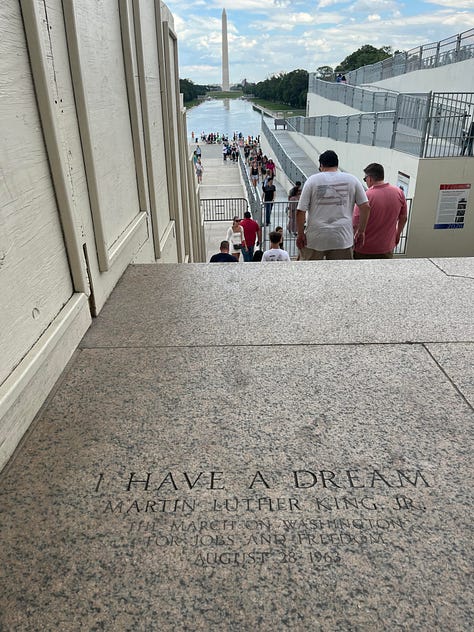
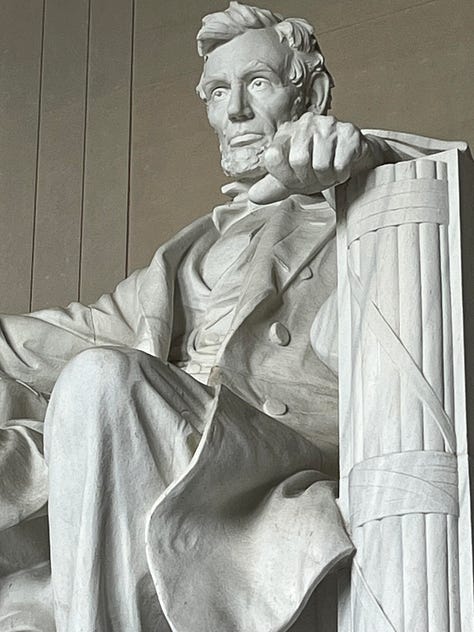
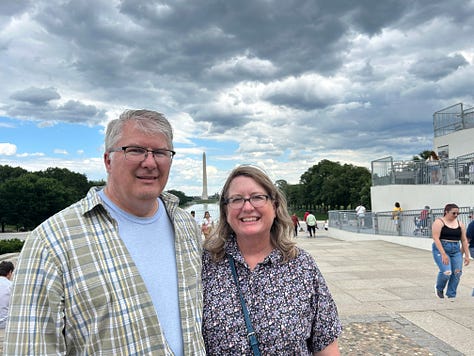
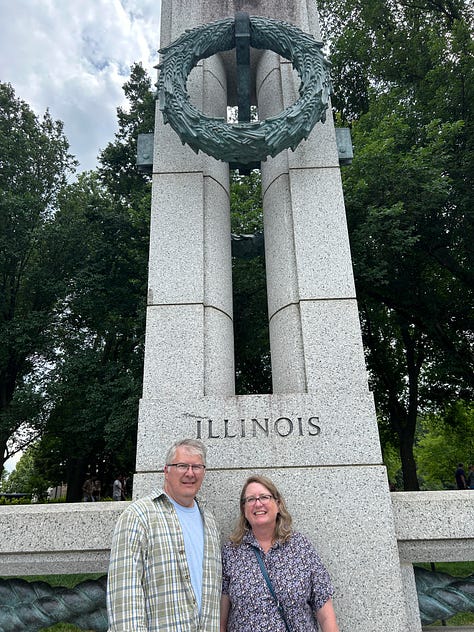
At the beginning of June, we enjoyed seeing Chloe and Brian over a long weekend in Roanoke. The Crases are moving to the Salt Lake City area in September to church plant with Plant Utah, so this was our “last hurrah” with them out east (note: listen below to a story from that trip in my sermon titled “Father Figuring,” given at Hanna City Pres on Father’s Day).
Tourists in Our Own Town
Upon returning to Springfield, Megan embarked on a week of dyslexic training and tutoring two local students. We also enjoyed hosting her father, Mike (he of the triple-bypass surgery just seven months ago), for his first ever visit to Springfield. It was a joy to have him with us.
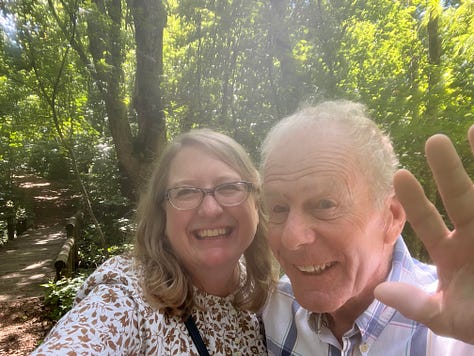
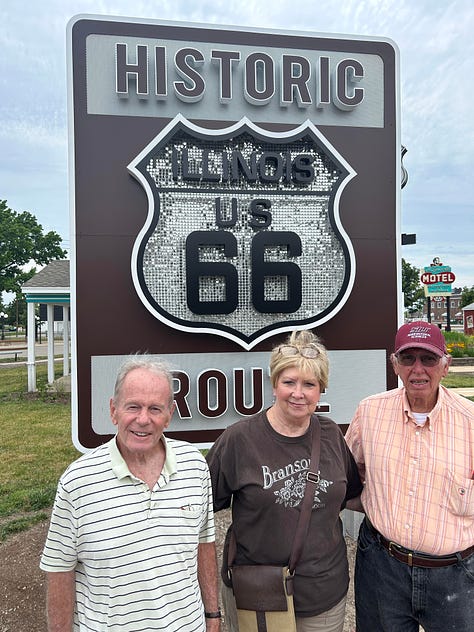

The corn is well-past “knee high by the Fourth of July” as the old timers used to hope for, and we’re trying to be good tourists in our own town this first full summer in Springfield. Three highlights thus far: the Abraham Lincoln Presidential Library and Museum, the Dana-Thomas House, and the Illinois Route 66 Experience housed on the Illinois State Fairgrounds.
A Look Ahead
Yesterday, Megan and I spent the latter part of Independence Day on the farm, and today we fly to Bozeman to visit our five-month old granddaughter. Here’s a look at what’s ahead:
July/early August
5-12: Craig and Megan visit Bruce, Maddie, Emily, and Millie (Bozeman, MT)
14: Craig preaches at Trinity Presbyterian Church (Aledo, IL)
21: Craig preaches at Exodus Church (Springfield, IL)
28: Craig preaches at Exodus Church (Springfield, IL)
31-August 2: Megan attends Classical Conversations reunion (Kansas City, MO)
August 4: Craig preaches at Covenant Fellowship Church (Champaign, IL)
Thanks for praying for our ministry here. And thanks (as always) for reading Second Drafts.
Craig (for Megan)
P.S.: In the postscript of last month’s newsletter, we shared with you Chloe’s projected financial shortfall (approximately $3,000) as she finishes her internship with Reformed Youth Ministries at Christ the King Presbyterian Church. Three days after our newsletter hit, Chloe called to tell us God had moved several of you to help meet her need (and then some). She (and we) are grateful to those who gave, and to the Lord for his generosity through you.
July 4th Musings of a Presidential Pen Pal

Dear Presidents Washington and Lincoln,
Greetings, good sirs. You both have been on my mind of late, and not just because of yesterday’s 248th celebration of our nation’s independence. I recently visited the city bearing your name, Mr. Washington, and have also lived a year now in the town made by yours, Mr. Lincoln. They both speak and think well of you, gentlemen, as do I.
I’m writing this day for no particular reason other than to say, well, I miss you both, as you’ve always been a part—two of the best parts, frankly—of my understanding of our national identity. Sure, there are the periodic political name drops, and more than one of your successors has at times tried to fashion himself as your heir (apparent or usually otherwise), but when it comes to Presidents, you two are the OGs (that’s “original gangstas” as the lingo goes)…the real MVPs…the GOATs. Before I forget, let me say thanks for being all of the above—very much then, as well as still now.
A Majority Does Not a Virtuous Society Make
It might do your hearts good to know that some of the best things about us are still attributed to you. Yesterday, our nation took some time (as we do each July 4) to again celebrate our independence, and while our festivities of freedom increasingly seem to focus on being free to do whatever we want rather than for the sake of “a more perfect union,” there is still a vestige of virtue in some folks who regard our rights as responsibilities more than merely entitlements.
To your shared credit, you both modeled this understanding well in your own lives; in fact, it still gets talked about how you, Mr. Washington, chose to step down from power for the sake of presidential precedent (there’s even a song—one of my favorites—from a popular musical about this), and, Mr. Lincoln, the way you worked with others to ensure freedom for others different than you remain hallmarks of your presidency.
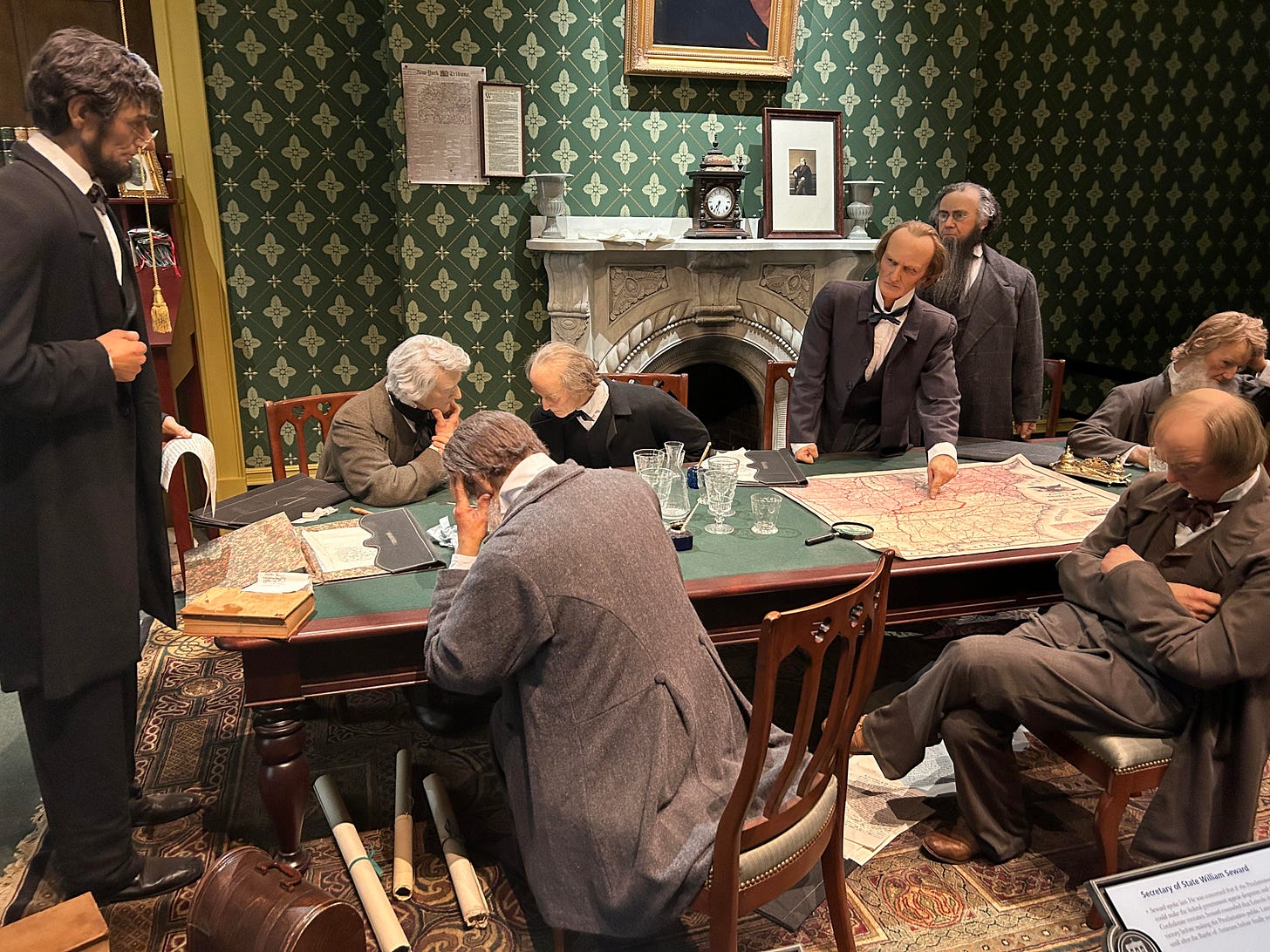
Walking through your particular hard times, you both did so with noble hearts and eternal hope, two other distinctive (though somewhat faltering) American traits. The way you took the high roads in the midst of the wars you oversaw definitely formed courage and conviction in the DNA (short for “deoxyribonucleic acid,” the genetic information inside the cells of the body that helps make people who we are) of our nation. In most cases, we still honor sacrifice when we see it, and there are plenty of passionate discussions about self-governance, democracy, and the like to go around.
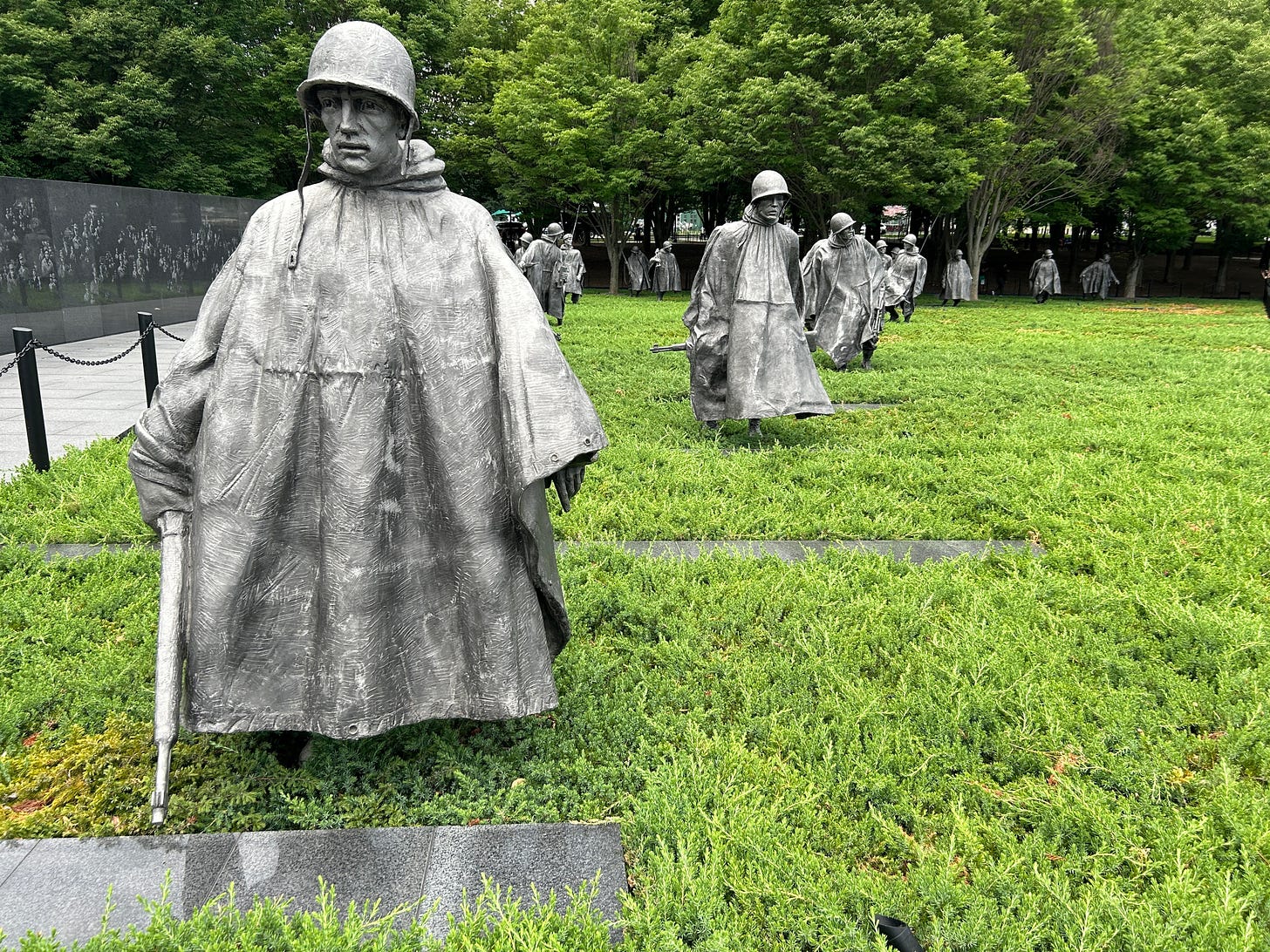

Unfortunately, there’s been significant detachment of these ideals from their historic biblical moorings, the foundation both of you recognized as key to a free people’s hope. Too many today have bought into the idea (particularly with regard to the Presidency) that winning populism can somehow determine right and wrong. You saw through the “might makes right” lie for what it is, as well as the truth that a majority does not a virtuous society make. Your prescience came out of the fact that what informed your tenures were transcendent principles from the Scriptures rather then the whims of a populace preoccupied with ourselves. Yours was the better modus operandi; we, sadly, have become little more than a nation of yelling pragmatists.
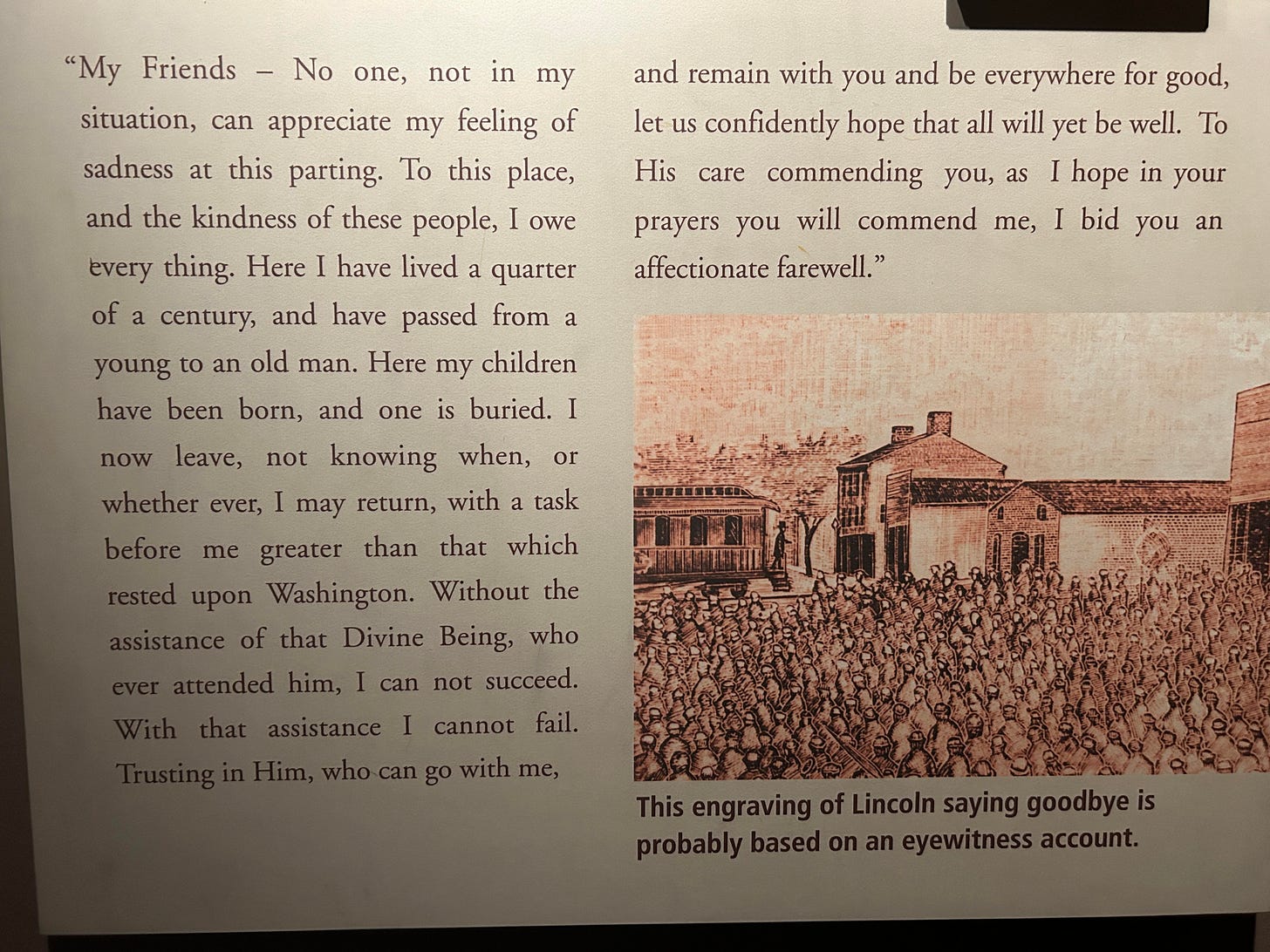
Dealing with the Dirty Business of Politics
All that said, perhaps what I miss most about the two of you is the breadth and depth of who you were—your character, your intellect, your temperament, your statesmanship. You lived lives of admirable and unique inspiration, and while neither you, Mr. Washington, nor you, Mr. Lincoln, was perfect, we remember you for your integrity, your brilliance, your peaceableness, and your wise and winsome words.
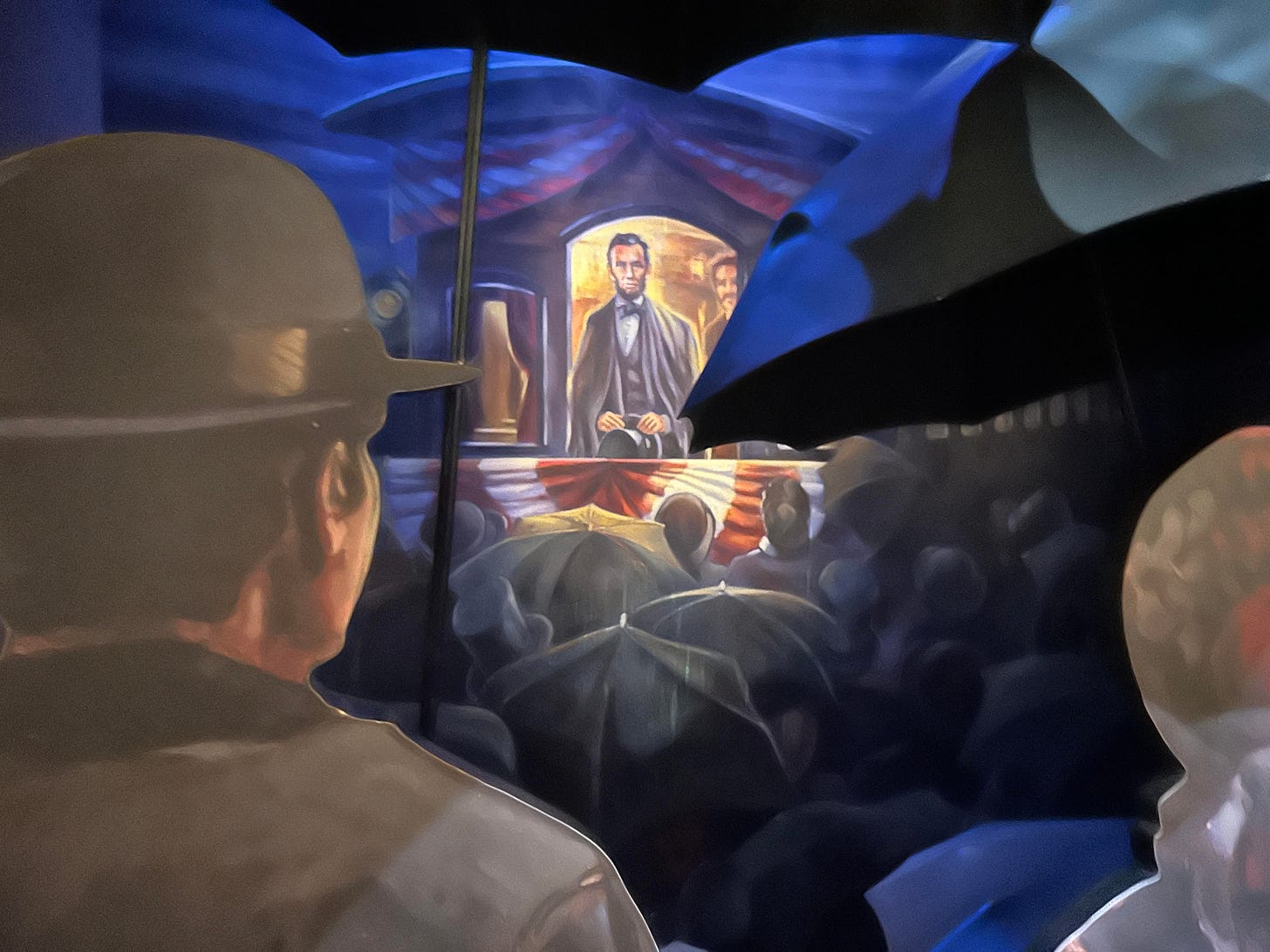
To be sure, politics was no less dirty a business in your time than in ours (I’ve read the editorials of your critics and seen the accompanying political cartoons of your day, and they—along with the duels!—were brutal). But both of you somehow mustered the resolve and rhetorical chops to fend off the worst of the attacks and maintain enough dignity to motivate and move the country forward. On the contrary, it is to our shame that, in a country of 330 million people, we are hard-pressed to find men of consistent backbone who need not rely on focus groups and popularity polls, speechwriters and teleprompters for your kind of principled perspective and cogent communication.

Instead, we’re left with a vacuum of leadership, and it boggles the mind how—in not even 250 short years—we got here. From my vantage point, there are at least a dozen factors to blame, not the three least of which are the systematization of education enamored with the development of skills rather than virtue; the corruption and fraud of both institution and populace; and the religion of self and secular humanism (and all its alphabet groups) that have taken over government, the size and scope of which would be especially disheartening to you.
For these and other reasons at play in our society, make no mistake: the outcome of it all has not been good, and our nation is (and continues to become) the worse for it.
Another Civil War?
I wish I could tell you there’s hope on the horizon for these United States; though we’re still the envy of parts of the world due to the ideals the two of you implemented and established, some of our leaders, along with a portion of our own citizenry, seem hellbent on championing amoral beliefs and behaviors that have taken their toll. We are perceived as weak and rotting from the inside, and were you to look at the state of many of our institutions at all levels of our republic, you would find it difficult to argue otherwise.
There are rumblings and rumors of wars—of another civil war, Mr. Lincoln—as a result of the cultural crevasse of values deepening across our nation. And, while I have a hard time imagining physical battles breaking out en masse, there certainly have been myriad wars of words and manifold outbreaks of skirmishes here and there. What I may have once thought as impossible does not seem as much so as before.
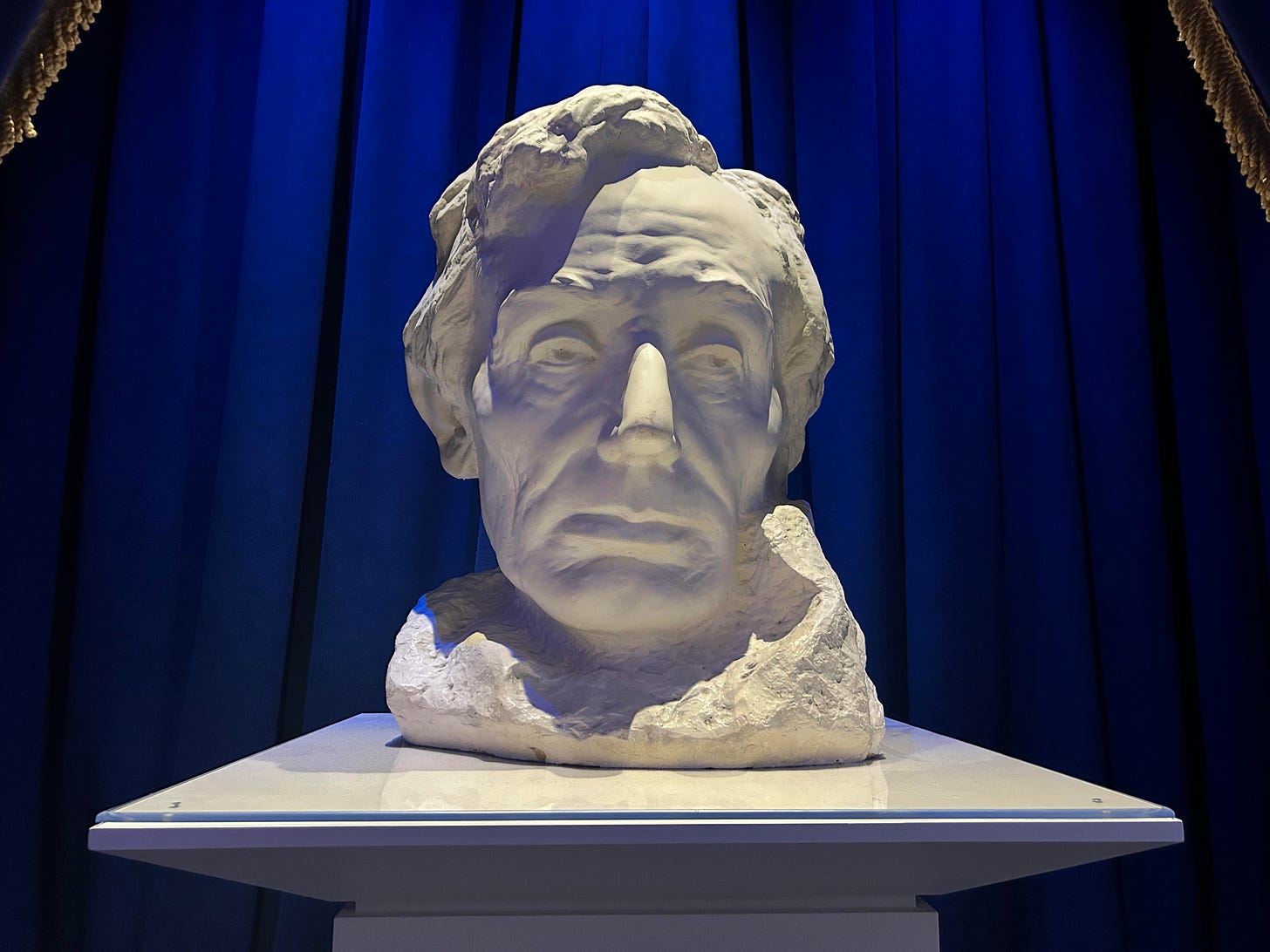
To be sure, some things are worth fighting for—the dignity and worth of every human life, pre-cradle to grave; the freedom and fair treatment of all people regardless of race or religion; the protection and care of those (especially the young) whose mental illness (and/or that of their parents) has brought on delusions of fluid gender and a basic denial of biological reality—but missing are the competent, humble, godly leaders able to speak truth—God’s truth—and resist calling evil, good and good, evil.
Neither Nationalism Nor Deism

What then, gentlemen, might be a solution? From my limited perspective, in similar times of similar challenges throughout our history, what made a difference were awakenings—Great Awakenings, as they would come to be called—in which “we the people” repented of our proclivities toward self and instead made much (or at least much more than before) of Jesus Christ and his call to love God and others.
I realize the specificity of my language here is more direct than yours in your day; though you were men of your Enlightened times, your commendation of “religion and morality” without more intentional naming of names—“Jesus”—could have been stronger. Whereas I’m grateful for independence and the formation of our republic, I’m here to call our nation to a monarchy, namely the Kingdom of King Jesus.
Now don’t hear what I’m not saying: I’m not advocating for some overlay replay of cultural Christianity (we’ve been there and done that through most of the 20th century through the early aughts and we’re reaping now what was sown). Nor am I talking about forcing the display of the Ten Commandments in schools or legislating that school teachers teach the Bible (honestly, the amount of classroom confusion and theological chaos this will cause makes my head and heart hurt in the consideration). All of this was/is nothing but conservative ham-handedness, and Christians will one day have to give an account to God for their idolatry of Christian nationalism.
That said, neither am I advocating for more so-called progressive Christians and their organizations (I hesitate calling them “churches”) to essentially pull a reverse Tom Jefferson and cut out of the Bible what they don’t like. Whereas Jefferson snipped out all references to Christ’s deity and miracles, too many today are trimming out Christ’s call to full obedience and lordship, intentionally undermining the Bible’s authority and replacing it with their own. They are no different than Jefferson in making Christianity deist, and for them, too, there will come a reckoning before the God whose authority they have tried to diminish and (in many cases) deny in the name of their more “progressive” faith.
Avoiding either extreme, any hope I have or prayer I utter for our country is not as a Republican or Democrat, nor as a conservative or a progressive, but as one seeking to make much of Christ and him crucified, resurrected, and reigning as the one worthy monarch of God’s Kingdom. No government, no military, no human institution will last beyond or supplant his administration; all will one day bow in worship of the only King who has ever been worthy of the title.
Despite your semi-veiled language at the time, gentlemen, I want to believe you knew all this. But while what I think of you matters little, what Christ knows—of you, of me, of everyone else—is all that counts. For as the Apostle Paul reminds us in Romans 6:22-23, being a slave to Christ is “a better freedom” than all the Independence Day celebrations could ever commemorate:
“22 But now that you have been set free from sin and have become slaves of God, the fruit you get leads to sanctification and its end, eternal life. 23 For the wages of sin is death, but the free gift of God is eternal life in Christ Jesus our Lord.”
Truly, gentlemen, ours has been and still is a fragile republic, and only “if you can keep it,” as Dr. Franklin so famously remarked. In comparison, the forgiveness and freedom found in Christ is the result of an assured promise Jesus has kept, and according to John 10:28, there is nothing whatsoever fragile about that.
In Conclusion
Thank you, good sirs, for your time here and your trouble on behalf of a (mostly) grateful nation. Only by God’s grace can we live up to the ideals you had in mind and modeled in the founding and fostering of these United States; you set a high bar.
In the meantime, please accept my humble and heartfelt thanks for living exemplary lives that continue to inspire us to do the same (even as we are particularly talented at shooting ourselves in the foot as we strive to put our best one forward).
Only by his grace has God loved and blessed our nation. May we respond accordingly, that we would be his people, and he would be our God.
Sincerely,
Craig Dunham
Once-Upon-a-Time Presidential Wannabe
PS: Is there really a secret entrance on the back side of Mount Rushmore leading to hidden treasure as the movie National Treasure seemed to allude? Asking for a friend...
Peaches’ Pick: I Cheerfully Refuse by Leif Enger
“The best futures are unforeseen and this keeps being true.”
Rainy in I Cheerfully Refuse
Claiming that Leif Enger’s latest novel, I Cheerfully Refuse, is “dystopian literature” (as the discussion questions in the back of the book do) is a stretch, much like declaring C.S. Lewis’ Space Triology “science fiction” is. Certainly there are dystopian elements (fear, dehumanization, quest for survival, environmental disaster, surveillance, oppression, resistance) that qualify it for the genre, but it’s just not Enger’s best; he’s too ebullient of a writer, particularly when compared to post-apocalyptic masters like Cormac McCarthy, and the attempt here doesn’t feel as authentic as his past works.
Set in the upper Midwest, the story of “a bereaved and pursued musician embarking under sail on a sentient Lake Superior in search of his departed, deeply beloved, bookselling wife” seems small in and of itself, but so does its context. Part Gulliver’s Travels, part The Odyssey, the story can’t decide if it’s satire or epic; thus, neither could I (though I would have been happy with either).
To me, what’s missing in I Cheerfully Refuse is a story with enough background, weight, and purpose to be told. While I learned a little about sailing and a little more about Lake Superior (which Enger masterfully gives personality), I had a hard time connecting the dots as to whether Enger was trying to describe and comment on the present or warn and wave us off of a less than desirable near-future.
In all of Enger’s books, his greatest literary strengths are the likeability of his characters and the lilt of his dialogue, but even these seem a little off here. In acquainting us with Rainy (short for “Rainier”) and his transition from being a “genial fighter, a boy of six words, a lummox grinning over pancakes” to a hopeless/helpless Romantic suddenly enamored with the classics because of his love for a girl, it just all seems too quick to be credible.
While I found myself rooting for Rainy as the protagonist, my biggest critique of him is he’s a (checks notes) bass player who accompanies himself (checks notes again) and sings solo for others? What self-respecting bass player does that? I’m trying to imagine my bass-playing friends plucking one note at a time while singing the chorus of “Freebird” or something and, well, I’m not buying it.
As I’ve been following Enger on social media the past few years, I may be reading into things a bit, but I was surprised by what seem several subtle but intentional political jabs at worst-case conservatism in the first 50 pages of the book. I don’t recall his tone being as (or at all) prevalent in his other books, but there seems a brooding, simmering agitation underlying Enger’s writing this time around, which may explain the choice of the dystopian setting and story for the book.
That said, I never quite figured out what Rainy refused (cheerfully or otherwise) and may have just missed it. Good prose for a summer read (especially near or on water), but I’ll re-read Peace Like a River or Virgil Wander before I revisit I Cheerfully Refuse.
Until next time…
Craig and Megan Dunham live in Springfield, IL, where Craig serves as Ministry Coordinator at Exodus Church while pursuing ordination in the Presbyterian Church in America. Megan teaches 2nd grade at Springfield Christian School and is an occasional newsletter contributor.
Know someone interested in the Dunhams’ ministry in Springfield? Share our newsletter.
Want to contact the Dunhams? Email either or both: Craig and Megan.




